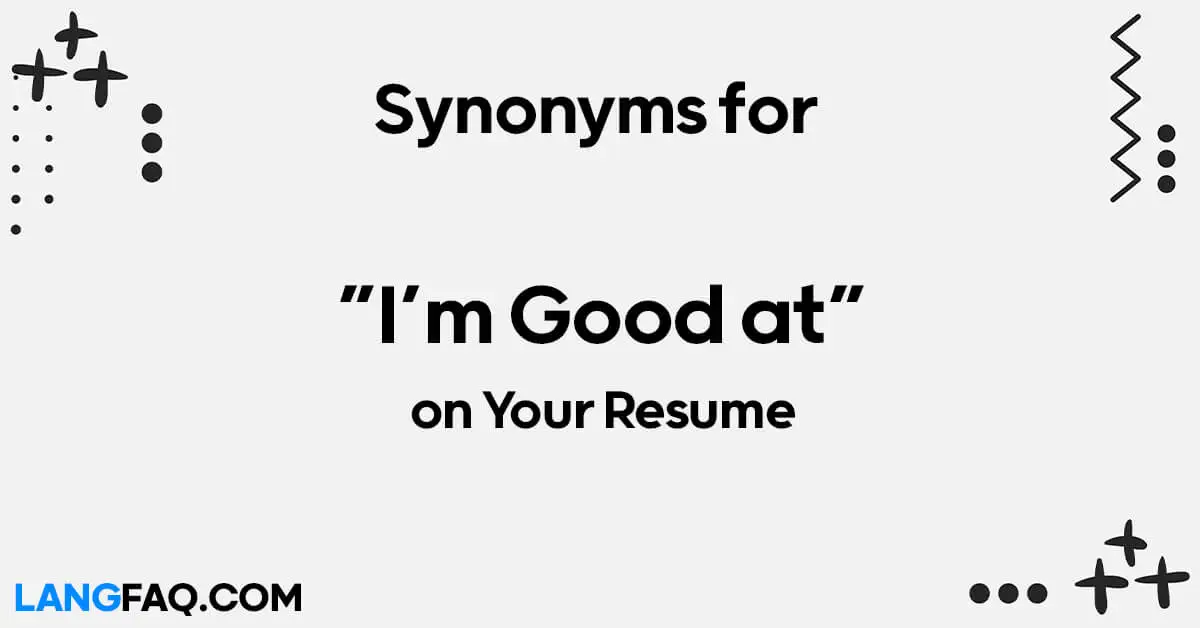Are you looking to elevate your resume and stand out in the competitive job market? Crafting a compelling resume is crucial, and one way to do so is by using synonyms for “I’m good at.”
In this comprehensive guide, we’ll explore 14 synonyms that can help you highlight your skills effectively on your resume. Whether you’re a seasoned professional or just starting your career journey, these alternatives will add depth to your qualifications.
Your resume serves as your ticket to job opportunities, and it’s essential to make it as impactful as possible. Instead of repeatedly stating that you are “good at” something, using synonyms can demonstrate your expertise more eloquently.
Let’s delve into 14 synonyms that will make your resume shine and leave a lasting impression on potential employers.
The Power of Synonyms
Synonyms are words or phrases that have similar meanings to others. By incorporating synonyms into your resume, you can avoid redundancy and create a more engaging narrative.
Employers appreciate candidates who can express their skills with precision and variety. Let’s explore these 14 synonyms and how to use them effectively.
14 Synonyms for “I’m Good at” on Your Resume
- Proficient In
- Accomplished At
- Skilled In
- Capable Of
- Competent In
- Adept At
- Knowledgeable In
- Expert At
- Seasoned In
- Talented In
- Competent At
- Experienced In
- Masterful At
- Skillful In
Each of these synonyms can replace the common phrase “I’m good at” and add depth to your resume. Below, we’ll discuss how to incorporate these synonyms into your resume effectively.
Proficient In: Elevating Your Skills on Your Resume
When it comes to crafting an exceptional resume, one word can make a significant difference: “Proficient.” This alternative to the common phrase “I’m good at” can add a layer of sophistication and expertise to your qualifications. Let’s dive deeper into how and when to use “Proficient In” on your resume.
Understanding “Proficient In”
“Proficient” implies a high level of skill and competence in a particular area. When you use “Proficient In” on your resume, you’re telling potential employers that you are not just skilled but exceptionally so. It conveys a sense of mastery and confidence in your abilities.
Where to Use “Proficient In”
- Technical Skills: “Proficient in Java programming and web development.”
- Languages: “Proficient in Spanish, both written and spoken.”
- Software: “Proficient in Adobe Photoshop for graphic design.”
- Soft Skills: “Proficient in time management and problem-solving.”
Rules for Using “Proficient In”
- Be honest: Only use “Proficient In” for skills you genuinely excel at.
- Provide evidence: Back up your claim with examples or certifications.
- Tailor to the job: Customize your resume to match the job description.
Exception: When Not to Use “Proficient In”
Avoid using “Proficient In” for basic, expected skills. For example, if you’re applying for a graphic design job, stating that you’re proficient in using a computer is unnecessary.
Tips for Using “Proficient In”
- Quantify your proficiency when possible (e.g., “Proficient in Python with five years of experience”).
- Use specific software or tools to showcase your expertise.
- Highlight skills relevant to the job you’re applying for.
Incorporating “Proficient In” into your resume can make a strong impression on employers, but remember to use it judiciously and authentically.
Accomplished At: Showcasing Achievements on Your Resume
Your resume is your chance to shine, and “Accomplished At” can help you do just that. This phrase goes beyond mere skills, emphasizing significant achievements and milestones in your career. Let’s explore how to effectively use “Accomplished At” on your resume.
Understanding “Accomplished At”
“Accomplished” conveys a sense of success and excellence. When you use “Accomplished At,” you’re not just stating your skills but showcasing your track record of success in a particular area.
Where to Use “Accomplished At”
- Project Management: “Accomplished at leading cross-functional teams to achieve project milestones.”
- Sales: “Accomplished at exceeding quarterly sales targets consistently.”
- Research: “Accomplished at conducting in-depth market research.”
Rules for Using “Accomplished At”
- Highlight specific achievements, such as percentages, figures, or awards.
- Focus on accomplishments that align with the job you’re applying for.
- Be prepared to discuss these accomplishments during interviews.
Exception: When Not to Use “Accomplished At”
Avoid using “Accomplished At” for skills that don’t involve significant achievements. It’s best suited for showcasing your standout moments.
Tips for Using “Accomplished At”
- Provide context for your accomplishments (e.g., “Accomplished at increasing website traffic by 50% in six months”).
- Tailor your achievements to match the employer’s needs.
- Be concise but impactful in describing your accomplishments.
Using “Accomplished At” on your resume can set you apart by emphasizing not just what you can do but what you’ve achieved in your career journey.
Skilled In: Versatility and Expertise on Your Resume
In the world of resume writing, “Skilled In” is a versatile and powerful phrase that can elevate your qualifications. It conveys expertise in various areas while showcasing your adaptability. Let’s explore how to effectively use “Skilled In” on your resume.
Understanding “Skilled In”
“Skilled” suggests a high level of competency, and “Skilled In” implies a proficiency that extends to multiple areas. When you use this phrase, you’re highlighting your adaptability and the breadth of your expertise.
Where to Use “Skilled In”
- Multi-disciplinary Roles: “Skilled in project management, data analysis, and customer relations.”
- Diverse Skillsets: “Skilled in web development, graphic design, and content marketing.”
- Jack-of-all-trades Roles: “Skilled in multitasking, problem-solving, and strategic planning.”
Rules for Using “Skilled In”
- Showcase a variety of skills, but ensure they are relevant to the job.
- Provide specific examples or experiences that demonstrate your versatility.
- Avoid listing too many skills; focus on quality over quantity.
Exception: When Not to Use “Skilled In”
Avoid using “Skilled In” when applying for specialized roles that require deep expertise in one specific area. In such cases, use more targeted phrases.
Tips for Using “Skilled In”
- Group related skills together to create a cohesive picture of your abilities.
- Prioritize skills based on the job description.
- Tailor your resume to emphasize skills that align with the employer’s needs.
“Skilled In” is a powerful phrase that showcases your adaptability and versatility, making it a valuable addition to your resume.
Capable Of: Showcasing Versatility and Potential on Your Resume
Your resume is a reflection of your potential and versatility, and the phrase “Capable Of” can help you convey that effectively. This alternative to “I’m good at” signifies your ability to adapt and learn quickly. Let’s explore how to use “Capable Of” on your resume to make a lasting impression.
Understanding “Capable Of”
“Capable Of” implies a readiness and aptitude to tackle various tasks or learn new skills. When used in your resume, it suggests that you possess the potential to excel in different areas.
Where to Use “Capable Of”
- Adaptive Roles: “Capable of adapting to new technologies and learning quickly.”
- Versatile Skills: “Capable of handling project management, data analysis, and market research.”
- Problem Solving: “Capable of identifying and resolving complex issues efficiently.”
Rules for Using “Capable Of”
- Provide examples or experiences that demonstrate your adaptability.
- Tailor your resume to match the job requirements.
- Use “Capable Of” for skills that you genuinely believe you can acquire or excel in.
Exception: When Not to Use “Capable Of”
Avoid using “Capable Of” when applying for roles that require specific expertise and where adaptability is not a primary requirement.
Tips for Using “Capable Of”
- Highlight your willingness to learn and adapt.
- Showcase instances where you successfully acquired new skills.
- Emphasize your potential to grow and excel in various areas.
By using “Capable Of” strategically in your resume, you can showcase your versatility and potential to prospective employers.
Competent In: Demonstrating Reliability on Your Resume
Reliability and competence are highly valued in the workplace, and “Competent In” is a phrase that can convey these qualities effectively. This alternative to “I’m good at” signals that you have the skills needed to perform a task efficiently and effectively. Let’s explore how to use “Competent In” on your resume to boost your credibility.
Understanding “Competent In”
“Competent” signifies having the necessary skills and knowledge to perform a task successfully. When you use “Competent In” on your resume, you’re assuring potential employers that you are reliable and capable.
Where to Use “Competent In”
- Technical Abilities: “Competent in coding and software development.”
- Organizational Skills: “Competent in time management and project planning.”
- Communication Skills: “Competent in written and verbal communication.”
Rules for Using “Competent In”
- Back up your claim with examples or experiences.
- Focus on skills that are essential for the job you’re applying for.
- Use “Competent In” when you can confidently perform a task without supervision.
Exception: When Not to Use “Competent In”
Avoid using “Competent In” for skills that are considered basic or trivial for the job you’re applying for. Reserve it for areas where competence truly matters.
Tips for Using “Competent In”
- Use quantifiable achievements to demonstrate your competence (e.g., “Competent in reducing project turnaround time by 20%”).
- Highlight how your competence has contributed to the success of your past projects or roles.
- Tailor your use of “Competent In” to align with the employer’s expectations.
“Competent In” is a phrase that conveys reliability and proficiency, making it a valuable addition to your resume, especially when seeking roles that require trustworthiness and capability.
Adept At: Emphasizing Problem-Solving Skills on Your Resume
Your ability to solve problems efficiently is a valuable asset in the workplace, and “Adept At” is a phrase that can help you showcase this skill effectively. This alternative to “I’m good at” signifies your proficiency in tackling challenges and finding innovative solutions. Let’s explore how to use “Adept At” on your resume to highlight your problem-solving prowess.
Understanding “Adept At”
“Adept” implies a high level of skill and mastery, particularly in the context of problem-solving. When you use “Adept At” on your resume, you’re emphasizing your capability to navigate complex situations successfully.
Where to Use “Adept At”
- Problem-Solving: “Adept at identifying and resolving complex issues efficiently.”
- Innovation: “Adept at finding innovative solutions to improve processes.”
- Adaptation: “Adept at adapting to changing environments and challenges.”
Rules for Using “Adept At”
- Provide concrete examples or experiences that demonstrate your problem-solving abilities.
- Focus on skills that are relevant to the job you’re applying for.
- Be prepared to discuss your adeptness during interviews.
Exception: When Not to Use “Adept At”
Avoid using “Adept At” for skills that don’t involve problem-solving or navigating challenges. It’s best suited for showcasing your prowess in these areas.
Tips for Using “Adept At”
- Highlight specific instances where your problem-solving skills led to positive outcomes.
- Showcase your adaptability and ability to think creatively.
- Tailor your use of “Adept At” to align with the employer’s expectations and the nature of the role.
“Adept At” is a phrase that conveys your problem-solving abilities effectively on your resume, positioning you as a valuable asset to potential employers.
Knowledgeable In: Demonstrating Depth of Expertise on Your Resume
In the competitive job market, demonstrating your depth of expertise can set you apart, and “Knowledgeable In” is a phrase that can help you achieve just that. This alternative to “I’m good at” signifies not just skill but a profound understanding of a subject. Let’s explore how to use “Knowledgeable In” on your resume to showcase your expertise.
Understanding “Knowledgeable In”
“Knowledgeable” goes beyond having mere skills; it implies a deep understanding and expertise in a particular domain. When you use “Knowledgeable In” on your resume, you’re indicating that you possess an in-depth understanding of the subject matter.
Where to Use “Knowledgeable In”
- Industry Knowledge: “Knowledgeable in industry regulations and compliance.”
- Technical Expertise: “Knowledgeable in advanced data analytics and machine learning.”
- Market Insights: “Knowledgeable in market trends and consumer behavior.”
Rules for Using “Knowledgeable In”
- Provide evidence of your expertise, such as certifications or specific accomplishments.
- Use “Knowledgeable In” for skills that are relevant to the job you’re applying for.
- Be ready to discuss your knowledge during interviews, showcasing your ability to apply it effectively.
Exception: When Not to Use “Knowledgeable In”
Avoid using “Knowledgeable In” for basic or entry-level skills. This phrase is most effective when applied to areas where a profound understanding is required.
Tips for Using “Knowledgeable In”
- Highlight your ability to apply your knowledge to solve complex problems or make informed decisions.
- Showcase how your expertise has positively impacted your previous roles or projects.
- Tailor your use of “Knowledgeable In” to align with the employer’s expectations and the nature of the role.
“Knowledgeable In” is a phrase that signals your deep expertise, making it an excellent addition to your resume when you want to demonstrate your comprehensive understanding of a subject.
Expert At: Signifying Mastery in Your Resume
Mastery of a skill or domain is a valuable asset, and “Expert At” is a phrase that can help you signify this level of proficiency effectively on your resume. This alternative to “I’m good at” conveys that you have reached the highest level of expertise. Let’s explore how to use “Expert At” on your resume to highlight your mastery.
Understanding “Expert At”
“Expert” signifies the highest level of skill and proficiency. When you use “Expert At” on your resume, you’re stating that you are not just good but exceptional and experienced in a particular field.
Where to Use “Expert At”
- Specialized Skills: “Expert at creating marketing strategies that drive ROI.”
- Technical Mastery: “Expert at advanced statistical analysis and data modeling.”
- Leadership: “Expert at leading and mentoring high-performance teams.”
Rules for Using “Expert At”
- Provide substantial evidence of your expertise, such as significant accomplishments or leadership roles.
- Use “Expert At” for skills that are directly relevant to the job you’re applying for.
- Be prepared to discuss your expertise extensively during interviews.
Exception: When Not to Use “Expert At”
Reserve “Expert At” for skills where you have truly achieved a level of mastery. Avoid using it for skills that require only a basic or intermediate level of competence.
Tips for Using “Expert At”
- Emphasize the impact of your expertise on past projects or roles.
- Showcase how your mastery has contributed to the success of your team or organization.
- Tailor your use of “Expert At” to align with the employer’s expectations and the specific requirements of the role.
“Expert At” is a phrase that signifies your mastery and experience, making it a compelling addition to your resume when you want to showcase your highest level of proficiency.
Seasoned In: Highlighting Years of Experience on Your Resume
Experience is a valuable asset in the job market, and “Seasoned In” is a phrase that can help you highlight your extensive years of experience effectively on your resume. This alternative to “I’m good at” signifies that you bring a wealth of knowledge and practical wisdom to the table. Let’s explore how to use “Seasoned In” on your resume to emphasize your seasoned expertise.
Understanding “Seasoned In”
“Seasoned” implies that you have been practicing and refining your skills over a long period. When you use “Seasoned In” on your resume, you’re telling potential employers that you possess a depth of experience that can only come with time.
Where to Use “Seasoned In”
- Career Experience: “Seasoned in project management with over a decade of experience.”
- Industry Expertise: “Seasoned in the healthcare industry, with 15 years of practical knowledge.”
- Leadership: “Seasoned in leading and mentoring teams to success.”
Rules for Using “Seasoned In”
- Provide a clear timeline or number of years to showcase your experience.
- Use “Seasoned In” for skills and roles where longevity and practical wisdom are highly valued.
- Be prepared to discuss your seasoned expertise during interviews, emphasizing how it benefits the employer.
Exception: When Not to Use “Seasoned In”
Avoid using “Seasoned In” for skills or roles where extensive experience is not a primary requirement. Reserve it for areas where your years of experience add significant value.
Tips for Using “Seasoned In”
- Emphasize how your extensive experience has enabled you to navigate challenges and make informed decisions.
- Showcase your ability to mentor and guide less experienced team members.
- Tailor your use of “Seasoned In” to align with the employer’s expectations and the specific needs of the role.
“Seasoned In” is a phrase that signifies your extensive years of experience, making it a powerful addition to your resume when you want to highlight your seasoned expertise.
Talented In: Spotlighting Natural Abilities on Your Resume
While skills can be acquired, talents are innate, and “Talented In” is a phrase that can help you spotlight your natural abilities effectively on your resume. This alternative to “I’m good at” signifies that you possess unique gifts that make you stand out in a particular area. Let’s explore how to use “Talented In” on your resume to emphasize your natural prowess.
Understanding “Talented In”
“Talented” suggests that you possess exceptional abilities in a specific domain, often due to natural aptitude. When you use “Talented In” on your resume, you’re communicating that your skills in a particular area go beyond mere training or practice.
Where to Use “Talented In”
- Creative Fields: “Talented in graphic design and creative visual storytelling.”
- Artistic Endeavors: “Talented in painting and creating visual art.”
- Musical Abilities: “Talented in playing the piano and composing music.”
Rules for Using “Talented In”
- Provide context or examples that demonstrate your natural talent.
- Use “Talented In” for skills that are directly relevant to the job you’re applying for.
- Be prepared to discuss your talents and how they set you apart during interviews.
Exception: When Not to Use “Talented In”
Reserve “Talented In” for skills or areas where your natural abilities truly shine. Avoid using it for skills that can be easily acquired through training or practice.
Tips for Using “Talented In”
- Showcase how your natural talents have led to exceptional outcomes or creative solutions.
- Emphasize how your unique abilities contribute to your team or organization.
- Tailor your use of “Talented In” to align with the employer’s expectations and the specific requirements of the role.
“Talented In” is a phrase that signifies your natural abilities, making it a compelling addition to your resume when you want to highlight your unique talents that set you apart from others.
Competent At: Demonstrating Core Skills on Your Resume
Core skills are the foundation of your professional journey, and “Competent At” is a phrase that can help you demonstrate your fundamental abilities effectively on your resume. This alternative to “I’m good at” signifies your reliability and proficiency in essential areas. Let’s explore how to use “Competent At” on your resume to showcase your core skills.
Understanding “Competent At”
“Competent” suggests that you have the necessary skills to perform a task effectively. When you use “Competent At” on your resume, you’re indicating that you possess the fundamental abilities required for success in a particular role.
Where to Use “Competent At”
- Foundational Skills: “Competent at multitasking and prioritizing tasks efficiently.”
- Basic Competencies: “Competent at using Microsoft Office suite for administrative tasks.”
- Essential Abilities: “Competent at written and verbal communication.”
Rules for Using “Competent At”
- Provide evidence or examples of your competence in these core skills.
- Use “Competent At” for skills that are directly relevant to the job you’re applying for.
- Be prepared to discuss how your core skills have contributed to your past successes during interviews.
Exception: When Not to Use “Competent At”
Avoid using “Competent At” for skills that require a higher level of expertise or specialization. This phrase is most effective for showcasing your proficiency in fundamental areas.
Tips for Using “Competent At”
- Emphasize how your core skills have consistently contributed to your professional achievements.
- Showcase your reliability and consistency in applying these skills.
- Tailor your use of “Competent At” to align with the employer’s expectations and the specific needs of the role.
“Competent At” is a phrase that signifies your core skills, making it a valuable addition to your resume when you want to demonstrate your reliability and proficiency in fundamental areas.
Experienced In: Demonstrating Proficiency Through Practice on Your Resume
Experience is a powerful asset, and “Experienced In” is a phrase that can help you demonstrate your proficiency through practical application effectively on your resume. This alternative to “I’m good at” signifies that you have hands-on knowledge and know-how in a particular field. Let’s explore how to use “Experienced In” on your resume to showcase your practical expertise.
Understanding “Experienced In”
“Experienced” implies that you have acquired knowledge and skill through practical application and real-world scenarios. When you use “Experienced In” on your resume, you’re indicating that you bring practical expertise to the table.
Where to Use “Experienced In”
- Hands-on Roles: “Experienced in managing client relationships and negotiations.”
- Fieldwork: “Experienced in conducting on-site inspections and data collection.”
- Technical Proficiency: “Experienced in using advanced software tools for data analysis.”
Rules for Using “Experienced In”
- Provide concrete examples or experiences that demonstrate your practical expertise.
- Use “Experienced In” for skills or roles where hands-on knowledge is highly valued.
- Be prepared to discuss how your practical expertise has contributed to your past successes during interviews.
Exception: When Not to Use “Experienced In”
Avoid using “Experienced In” for skills or roles where theoretical knowledge or academic qualifications are more relevant. This phrase is most effective for showcasing your practical proficiency.
Tips for Using “Experienced In”
- Emphasize how your practical expertise has led to efficient problem-solving and decision-making.
- Showcase your ability to apply theoretical knowledge in real-world scenarios.
- Tailor your use of “Experienced In” to align with the employer’s expectations and the specific requirements of the role.
“Experienced In” is a phrase that signifies your practical knowledge and expertise, making it a compelling addition to your resume when you want to showcase your proficiency through real-world practice and application.
Skillful In: Showcasing Precision and Dexterity on Your Resume
Precision and dexterity in your skills can be a valuable asset in many professions, and “Skillful In” is a phrase that can help you highlight these qualities effectively on your resume. This alternative to “I’m good at” signifies that you possess a high degree of accuracy and proficiency in a particular area. Let’s explore how to use “Skillful In” on your resume to emphasize your precision and dexterity.
Understanding “Skillful In”
“Skillful” suggests a high level of competence and mastery, particularly when it comes to precise and dexterous tasks. When you use “Skillful In” on your resume, you’re indicating that you excel in performing tasks with accuracy and finesse.
Where to Use “Skillful In”
- Fine Motor Skills: “Skillful in surgical procedures requiring precision and attention to detail.”
- Artistic Proficiency: “Skillful in intricate jewelry design and craftsmanship.”
- Data Entry: “Skillful in accurate data entry and maintaining data integrity.”
Rules for Using “Skillful In”
- Provide examples or experiences that demonstrate your precision and dexterity.
- Use “Skillful In” for skills that require meticulous attention to detail.
- Be prepared to discuss how your skillful approach has contributed to your past successes during interviews.
Exception: When Not to Use “Skillful In”
Avoid using “Skillful In” for skills that do not involve precision or dexterity. This phrase is most effective for showcasing your accuracy and finesse in particular areas.
Tips for Using “Skillful In”
- Emphasize how your precision and dexterity have led to consistently accurate results.
- Showcase your ability to handle intricate or delicate tasks with ease.
- Tailor your use of “Skillful In” to align with the employer’s expectations and the specific requirements of the role.
“Skillful In” is a phrase that signifies your precision and dexterity, making it a compelling addition to your resume when you want to emphasize your accuracy and finesse in performing tasks that require meticulous attention to detail.
Using Synonyms in Your Resume
When integrating these synonyms into your resume, consider the context and the specific skills you want to highlight. Here’s how you can use them:
- Proficient In: Use this synonym when you have a high level of expertise in a particular skill or field. For example, “Proficient in data analysis and statistical modeling.”
- Accomplished At: Highlight significant achievements in your career. “Accomplished at leading cross-functional teams to achieve project milestones.”
- Skilled In: Showcase your expertise in various areas. “Skilled in software development, project management, and customer relations.”
- Capable Of: Emphasize your potential and versatility. “Capable of adapting to new technologies and learning quickly.”
- Competent In: Demonstrate your competence and reliability. “Competent in managing budgets and financial planning.”
- Adept At: Show your adeptness and agility. “Adept at problem-solving and finding innovative solutions.”
- Knowledgeable In: Display your depth of knowledge. “Knowledgeable in industry regulations and compliance.”
- Expert At: Assert your expertise. “Expert at creating marketing strategies that drive ROI.”
- Seasoned In: Highlight your years of experience. “Seasoned in project management with over a decade of experience.”
- Talented In: Showcase your natural talents. “Talented in graphic design and creative visual storytelling.”
- Competent At: Emphasize your competency. “Competent at multitasking and prioritizing tasks efficiently.”
- Experienced In: Stress your accumulated experience. “Experienced in handling client relationships and negotiations.”
- Masterful At: Convey mastery in a specific skill. “Masterful at data visualization and presentation.”
- Skillful In: Highlight your skillfulness. “Skillful in using advanced software tools for data analysis.”
FAQs
Can I use more than one synonym in my resume?
Yes, you can use multiple synonyms to diversify your language and emphasize different skills.
Should I use synonyms for every skill on my resume?
While synonyms can enhance your resume, use them judiciously and where they fit naturally.
Is it essential to match synonyms with specific skills?
Ideally, try to match synonyms with skills that align closely with their meanings for the most impact.
How can I make my resume more compelling?
In addition to synonyms, focus on quantifying your achievements and using action verbs to describe your experiences.
Should I customize my resume for each job application?
Yes, tailoring your resume to each job listing can increase your chances of getting noticed by recruiters.
What are some common resume mistakes to avoid?
Avoid typos, overly long resumes, and irrelevant information. Keep it concise and relevant.
Conclusion
Incorporating synonyms for “I’m good at” on your resume can make a significant difference in how potential employers perceive your skills and qualifications. These alternatives add sophistication and depth to your resume, helping you stand out in a competitive job market. Craft your resume with precision and showcase your expertise effectively. Get ready to make a lasting impression and secure the job opportunities you desire.







